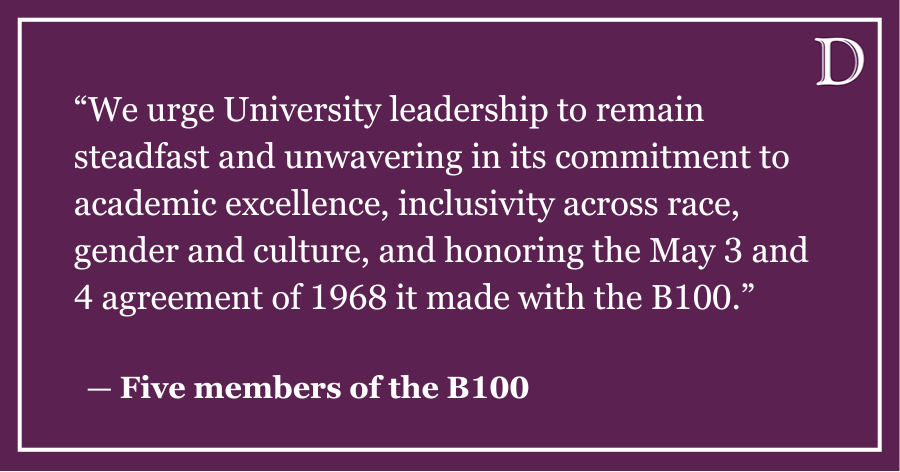Content warning: This article contains mentions of sexual violence.
Many years ago, I volunteered for a sexual assault hotline. I was overwhelmed — not only by the staggering number of women and girls I spoke with and the harrowing stories they shared, but also by the realization that they represented only a small fraction of the countless survivors of sexual violence.
This awareness — combined with my own experiences and the many disclosures I’ve received from friends over the years — catalyzed my decision to pursue a career in clinical psychology and mental health counseling.
Northwestern has expressed a commitment to addressing issues affecting vulnerable populations — a key factor in my decision to attend The Graduate School. This commitment aligns with my professional goals: to conduct research and provide psychotherapy to survivors of sexual violence and exploitation.
Thus far, my program has largely upheld this value with one glaring exception: Women and girls — who comprise the majority of the population I aim to serve — have been almost entirely omitted from the curriculum.
In a class devoted to diverse identities, we spent an entire week on gender. The challenges faced by transgender women were discussed at length, but women as a category were never mentioned — nor were issues that disproportionately affect them, such as sexual violence, commercial sexual exploitation or reproductive justice.
The only nod to a feminist perspective came in an informal announcement from our professor, who offered a brief synopsis of feminist therapy approaches paired with a disclaimer that these principles need not apply to “women,” but could be used with other marginalized groups — yes, the word women was actually placed in quotation marks.
I can only recall one reference to intimate partner violence during my time at NU. In that course, we were assigned two articles: one that examined abuse in lesbian relationships, and another that inaccurately attributed equal rates of perpetration to men and women. The prevalence of male violence against women and girls went entirely unacknowledged — even though, given its well-established link to post-traumatic stress disorder, it should be treated as a core competency in any clinical training program.
The professors at NU are intelligent and empathic. I have no doubt their intentions are good. But surely, as seasoned clinicians with active, client-facing practices, they are aware of current statistics that directly impact the field.
They must know, for instance, that the CDC released data as recently as 2021 indicating that teenage girls are experiencing a mental health crisis, with record-high levels of violence, psychological distress and suicide risk. They must also be aware that even more conservative estimates suggest at least one in six women in the United States has experienced sexual violence — and globally, at least one in three women has experienced sexual or physical violence.
In my view, the most plausible explanation for the sidelining of cisgender women is that social justice discourse — now dominant in academia — is plagued by a zero-sum fallacy. Rooted in socialist theory, this mindset holds that one group’s gain must necessarily come at another’s expense.
This has fostered the false belief that addressing issues affecting cisgender women undermines queer advocacy, leading to a reflexive dismissal of feminist concerns — particularly on complicated issues like the erosion of single-sex spaces.
Any mention of the potential risks posed by policies that grant access to female spaces based on gender self-identification is dismissed as “TERF” bigotry, as though such apprehensions were intended to harm the LGBTQ+ community rather than to initiate a legitimate discussion about the potential for bad actors to exploit these policies.
Feminists bear some responsibility for our own marginalization. Cultural conditioning teaches women to prioritize kindness, social acceptance and modesty above all else. Consequently, our instinct for self-preservation often clashes with our desire to be liked, making it difficult to advocate for ourselves.
The archaic gender roles projected onto the feminist movement impose expectations not applied to any other political cause. Cisgender women — still unconsciously relegated to the roles of nurturer and self-sacrificial caregiver — are expected to champion everyone’s rights but their own, serving as a kind of wet nurse to other agendas.
A feminism that unapologetically pursues its own objectives defies traditional notions of femininity and is therefore excoriated.
Neither the feminist nor queer movements benefit from a zero-sum framework. It only deepens the divide between two groups already strained by internecine conflict.
Rather than excluding cisgender women in an effort to elevate queer identities, we should engage in good-faith discourse that seeks to untangle the complexities of both experiences — to acknowledge where they converge, where they diverge and how to support each group without compromising the other.
This is an intellectually demanding task, but one that the exceptionally bright NU community is capable of undertaking. Failing to do so risks producing a generation of mental health practitioners ill-equipped to serve cisgender females, who account for roughly half the population and continue to bear the brunt of an unabating epidemic of sexual violence and exploitation.
Forest Romm is a student at The Graduate School. She can be contacted at [email protected]. If you would like to respond publicly to this op-ed, send a Letter to the Editor to [email protected]. The views expressed in this piece do not necessarily reflect the views of all staff members of The Daily Northwestern.

















